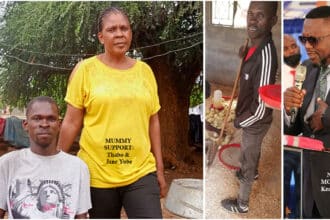In this week’s column, we feature energetic former auditor, Redemption Mosala who now serves at the Finance Manager of Belabela Quarries.
The 34-year-old John Mackenzie Secondary School alumni speaks to Voice Money’s KABELO ADAMSON about the nature of the company’s business.
The diminutive father-of-two, who may be short in size but is as chiseled as the tough stones his company dig up, also outlines the measures Belebela Quarries have taken to prepare against COVID-19.
Q. Briefly explain what your role as Finance Manager involves.
I sometimes feel Finance and Administrative Manager would be a more appropriate title (laughing).
I am the financial overseer of the company.
Every Thebe that leaves I should feel the pain!
So the main job overall is to make sure I minimize any wasteful expenditure and whatever expenditure we incur we do the most out of it.
For every Pula that we spend, we make sure that we get top value out of it.
So, it is cost management in a sense. Because we are a medium-size company that is still growing, there are no limited roles.
I am also involved in marketing, as well as taking care of the Information Technology department.
As I said, I do administrative work as well and there are a lot of financial and sales aspects.
The financial aspect involves minimizing costs while the sales part of it is about maximizing the revenue, which is cash in.
I have to set up a system to make sure that the cash flows are in a controlled manner.

Q. When did you join the company and where were you before that?
I joined the company in 2014.
Before that I worked as an auditor for PricewaterhouseCoopers (PwC).
Q. Kindly explain to our readers the nature of your business.
We are quarrying a type of stone called granite; it is the most abrasive kind of stone you can quarry.
Abrasive as in one of the toughest you can ever find! Obviously our machines suffer a lot, but what it also means is our clients get a good quality product.
The process starts in a simple way, we drill, blast using dynamites then break them into smaller stones.
We put those stones in a jaw and crush into smaller sizes and from there we come up with products which make bricks and for plastering.
Those are our biggest selling products.
Q. What other products do you produce?
We do have road stones, which come in a variety depending on their sizes.
The products are mixed with bitumen which is then placed on roads to make asphalt and tar roads.
We also produce stones, which are usually used on railway lines.
Q. Who makes up the bulk of your clientele?
Our clients are all companies that build roads and construction companies.
When it comes to crush dust, our clients are mostly individuals.
Then we have those who are building these shopping centres.
But I can tell you, 48 percent of our clients are individuals and are actually the heart and soul of this business.
Q. Do you also sell your products outside the country?
No. We don’t sell outside the border because there might be some difficulties in terms of how we export a load of dust.
The other thing that you have to bear in mind is that transport will become more expensive.
For example, if you deliver in Jwaneng you will find that transport costs as much as the product and once you go further say Sekoma, the cost of transport doubles.
So, if you are going to export, you export to where?
We don’t really export as it stands now – instead we offer mobile crushing.
Q. What are the biggest challenges you face in this line of work?
We use all types of equipment such as liners and conveyors and our buckets for loaders which have got blades and those blades break weekly.
We have to replace them every week because the stone is so hard.
All these machines we have to replace the parts and we are spending quite a lot of money every month just to repair them.
Nothing lasts long here.
I can’t give you the exact figures but it’s quite a lot of money!

Q. How many employees do you have?
We normally operate on 70 but we recently employed another 20 to deal with what seems to be an increase in demand.
We have engaged about four students from Botswana International University of Science and Technology (BIUST).
We are trying to take more people from the school and have more skilled guys and we really have a close relationship with BIUST.
Q. Is the company also taking care of the transportation part?
No, we subcontracted the transport business; we are not involved in it at all and are completed by subcontractors.
We have about 15 truck owners that we have engaged most of them funded by CEDA.
One of the most unfortunate things about my job is that every week I get at least four truck owners asking to have their trucks in the system but we have got enough trucks.
There is only so much we can do; we need more big projects in order to engage more truck owners.
The last time I put in more trucks was during the construction of the Phakalane road passing through Glen Valley.
Q. And lastly, how is the outbreak and spread of COVID-19 affecting your business?
Well, as it stands now we are monitoring the situation and listening to all the streams of information that we can including the Ministry of Health here.
But because we are part of a group where a lot of the shareholders are South Africa based and they are telling us the measures to take, we try to tailor-make those measures to suit our situation.
For now, we have done all the disinfecting being advised and so forth.
We will see as time goes on how the situation turns out.





